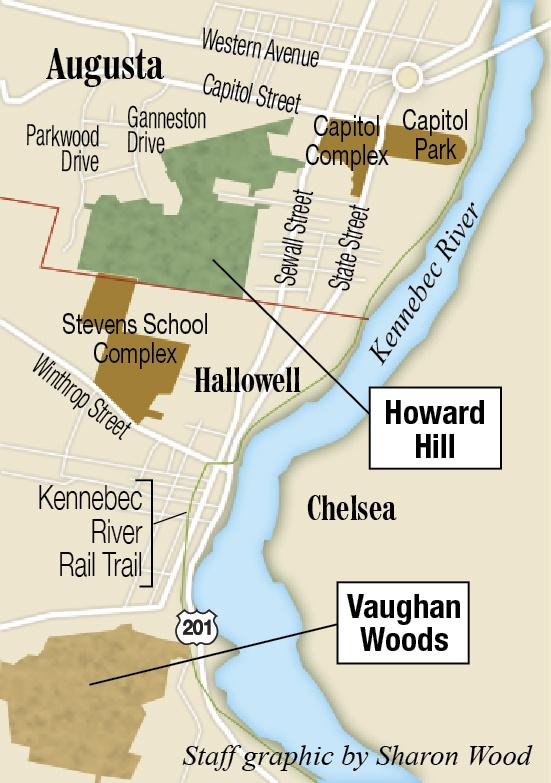AUGUSTA — A newly proposed plan for the 164-acre Howard Hill conservation area envisions a “historical forest park” with parking available near it at the State House complex and on Ganneston Drive in Augusta and on the Stevens Commons property in Hallowell.
The project calls for creation of several miles of recreational trails and a picnic area and the removal of some trees, which would clear expansive scenic views of the state Capitol and areas east of the Kennebec River from its high vantage points.
The plan for the city-owned land comes after years of repeated criticism of the land’s value from a prominent neighbor who just happens to be at the highest level of state government: Gov. Paul LePage.
The city was given the land last year by Kennebec Land Trust, which bought the wooded, steeply hilly property that provides a largely undeveloped backdrop to the Maine State House, from local attorney Sumner Lipman in 2015. The land trust gave the land to the city with a conservation easement, banning it from ever being developed.
The land trust purchased the property — named for the family of Capt. James Howard, one of the founders of Augusta — for about $925,000, even though its city appraisal for tax purposes was $171,000. The land trust raised money to pay for the project, and it used $163,500 in Land for Maine’s Future money to help fund the purchase. The Land for Maine’s Future funding was reduced to that amount, from the previously proposed amount of $337,500, following criticism of the acquisition by LePage, who also had withheld voter-approved conservation bonds for the project temporarily.
Now conservationists say the development vision for the property won’t be possible without a group of volunteers to help make it happen.
“We want to be clear we don’t want to load the city with additional responsibilities. We want this to be a volunteer-driven operation,” Ansley Sawyer, of the Augusta Conservation Commission, told the City Council at a meeting Thursday night. “It will be, certainly, supervised by the city, but volunteers need to step forward and provide the incentive and opportunities to do the projects we’re envisioning. People of Augusta, we’re going to need your help.”
The plan for the property, which is on the city’s border with Hallowell, includes access points and parking for trail users on the State House complex; on Ganneston Drive, which winds its way past homes up the hill and which already provides access to informal trails on the property; and on the Stevens Commons property in Hallowell.
The plan also includes some cutting of trees on the property, both to clear views from planned hillside overlooks and for the overall health of the forest.
Leif Dahlin, the city’s community services director, said managed forests do best when some planned harvesting of trees takes place. That eventually will provide some revenue to the city, Dahlin said.
However, Dahlin said most of the wood on the property now is beech, some of it diseased. He said it would be decades before better-quality trees are tall enough to be harvested there and produce revenue.
The plan also includes a trail network, which could be used by hikers, mountain bikers, skiers, snowshoers, and other low-impact users. The trails could lead users to scenic viewpoints and unique historical, geologic and natural features such as stone walls, old quarry sites, steep cliffs and towering trees. The trail network would include several loops with wide paths, and narrower connecting trails providing access to the park’s more remote areas.
City councilors expressed support for the proposed plan Thursday.
“This is very impressive, and I hope it unfolds the way you envision it,” said At-large Councilor Mark O’Brien.
The draft management plan, put together by consultants for the land trust and city, is expected to go to councilors for a vote Feb. 1.
Sawyer said people interested in volunteering to help with the Howard Hill project may send an email to howardhill.augusta@gmail.com.
Dahlin said it would seem to be a natural fit to involve Augusta Trails, a local nonprofit organization which works to create and connect recreational trails in Augusta, in the project.
The property once was owned by William Howard Gannett, who in the 1890s bought some 450 acres including Howard Hill — where he created Ganneston Park. The park included gardens, ponds, carriage paths and trails he opened to the public so they could enjoy the natural setting as his family did in their log cabin lodge on the site, Camp Comfort, so named because Gannett was publisher of Comfort Magazine, the first American periodical to reach a circulation of more than 1 million.
The Gannetts had a large, apparently cliffside treehouse on the property, though no signs of the treehouse remain.
The management plan for the property recommends it be named Howard Hill Historical Park.
Keith Edwards — 621-5647
Send questions/comments to the editors.





Comments are no longer available on this story